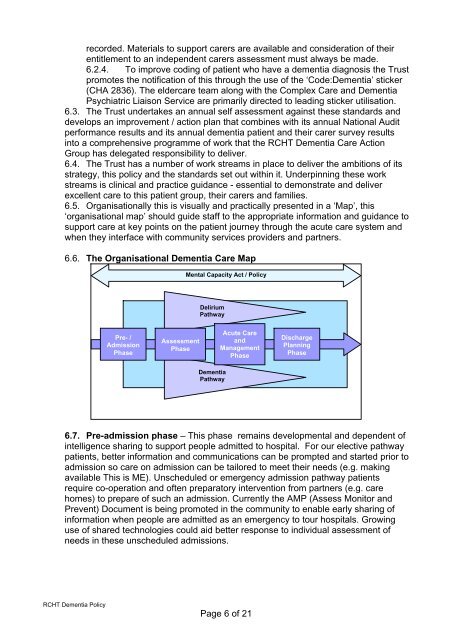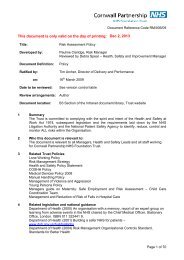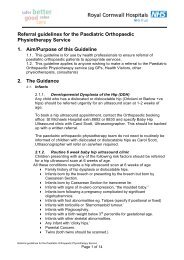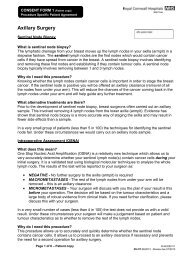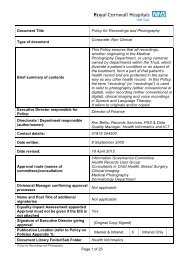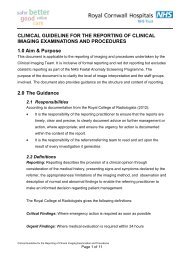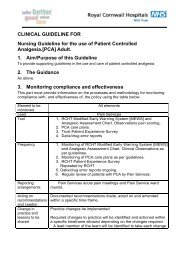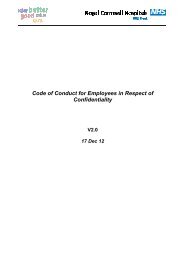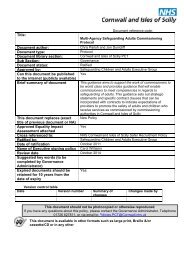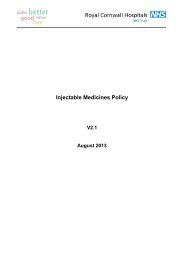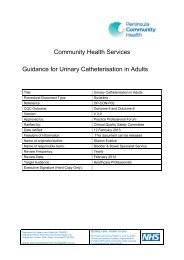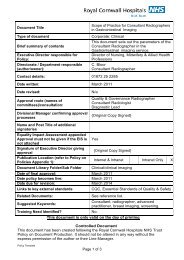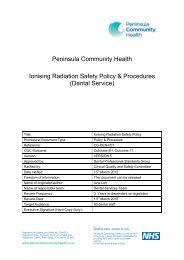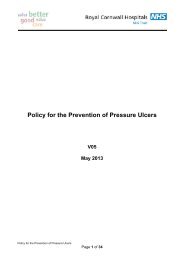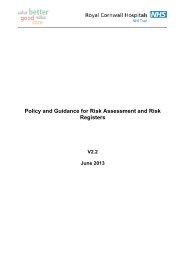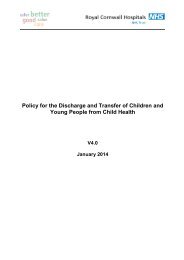RCHT Dementia Care Policy - the Royal Cornwall Hospitals Trust ...
RCHT Dementia Care Policy - the Royal Cornwall Hospitals Trust ...
RCHT Dementia Care Policy - the Royal Cornwall Hospitals Trust ...
Create successful ePaper yourself
Turn your PDF publications into a flip-book with our unique Google optimized e-Paper software.
ecorded. Materials to support carers are available and consideration of <strong>the</strong>ir<br />
entitlement to an independent carers assessment must always be made.<br />
6.2.4. To improve coding of patient who have a dementia diagnosis <strong>the</strong> <strong>Trust</strong><br />
promotes <strong>the</strong> notification of this through <strong>the</strong> use of <strong>the</strong> ‘Code:<strong>Dementia</strong>’ sticker<br />
(CHA 2836). The eldercare team along with <strong>the</strong> Complex <strong>Care</strong> and <strong>Dementia</strong><br />
Psychiatric Liaison Service are primarily directed to leading sticker utilisation.<br />
6.3. The <strong>Trust</strong> undertakes an annual self assessment against <strong>the</strong>se standards and<br />
develops an improvement / action plan that combines with its annual National Audit<br />
performance results and its annual dementia patient and <strong>the</strong>ir carer survey results<br />
into a comprehensive programme of work that <strong>the</strong> <strong>RCHT</strong> <strong>Dementia</strong> <strong>Care</strong> Action<br />
Group has delegated responsibility to deliver.<br />
6.4. The <strong>Trust</strong> has a number of work streams in place to deliver <strong>the</strong> ambitions of its<br />
strategy, this policy and <strong>the</strong> standards set out within it. Underpinning <strong>the</strong>se work<br />
streams is clinical and practice guidance - essential to demonstrate and deliver<br />
excellent care to this patient group, <strong>the</strong>ir carers and families.<br />
6.5. Organisationally this is visually and practically presented in a ‘Map’, this<br />
‘organisational map’ should guide staff to <strong>the</strong> appropriate information and guidance to<br />
support care at key points on <strong>the</strong> patient journey through <strong>the</strong> acute care system and<br />
when <strong>the</strong>y interface with community services providers and partners.<br />
6.6. The Organisational <strong>Dementia</strong> <strong>Care</strong> Map<br />
Mental Capacity Act / <strong>Policy</strong><br />
Delirium<br />
Pathway<br />
Pre- /<br />
Admission<br />
Phase<br />
Assessment<br />
Phase<br />
Acute <strong>Care</strong><br />
and<br />
Management<br />
Phase<br />
Discharge<br />
Planning<br />
Phase<br />
<strong>Dementia</strong><br />
Pathway<br />
6.7. Pre-admission phase – This phase remains developmental and dependent of<br />
intelligence sharing to support people admitted to hospital. For our elective pathway<br />
patients, better information and communications can be prompted and started prior to<br />
admission so care on admission can be tailored to meet <strong>the</strong>ir needs (e.g. making<br />
available This is ME). Unscheduled or emergency admission pathway patients<br />
require co-operation and often preparatory intervention from partners (e.g. care<br />
homes) to prepare of such an admission. Currently <strong>the</strong> AMP (Assess Monitor and<br />
Prevent) Document is being promoted in <strong>the</strong> community to enable early sharing of<br />
information when people are admitted as an emergency to tour hospitals. Growing<br />
use of shared technologies could aid better response to individual assessment of<br />
needs in <strong>the</strong>se unscheduled admissions.<br />
<strong>RCHT</strong> <strong>Dementia</strong> <strong>Policy</strong><br />
Page 6 of 21


